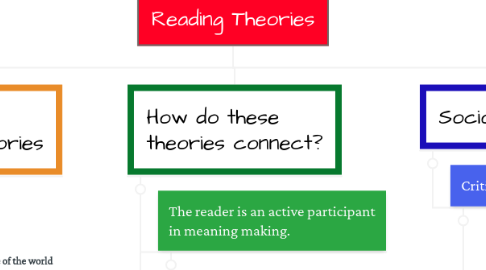
1. How do these theories connect?
1.1. The reader is an active participant in meaning making.
1.1.1. New knowledge is integrated with existing knowledge
1.2. The background and culture a reader brings to a text can change their interpretation.
1.2.1. What a reader brings to the text can be affected by a multitude of factors
1.2.2. Each reader can construct a different meaning or interpretation of a singular text
1.3. Theorists agree there is no "correct" meaning to a text.
2. Constructivist/ Psychological Theories
2.1. Schema Theory
2.1.1. Schema: organized knowledge of the world
2.1.2. Interpretations and meanings of text are actively constructed from a readers's schema
2.1.3. A reader with no schema of a topic cannot easily construct meaning, and the stronger the schema, the stronger the learning
2.1.4. Schema needs to be activated prior to reading to bridge knowledge and learning
2.2. Transactional (Reader Response) Theory
2.2.1. Linguistic/Experiential Reservoir: an individual's past transactions in natural and social contexts
2.2.2. Interpretations and meanings of text are constructed by drawing on personal linguistic/experiential reservoir
2.2.3. Reading is an individualized transaction between reader and text
2.2.4. Readers adopt an efferent (fact oriented) or aesthetic (emotional) stance on reading and organize text meaning through an evocation
2.3. Psycholinguistic Theory
2.3.1. Reading is primarily a language process
2.3.2. Readers use knowledge about the world and language/language cueing systems to engage in reading process
3. Sociological Theories
3.1. Critical Literacy Theory
3.1.1. Cultural Resources: cultural products and an identity a reader possesses through social relationships and norms
3.1.1.1. Cultural resources are shaped by politics, economics, religion, and other social participation
3.1.2. Reading is a social practice where text is used as a means for the construction and reconstruction or statements, messages, or meanings
3.1.3. Through reading, readers develop a critical thinking mind and skepticism
3.1.4. Meaning is made when the reader is a participant in a social/cultural/political world and uses this to construct a stance

